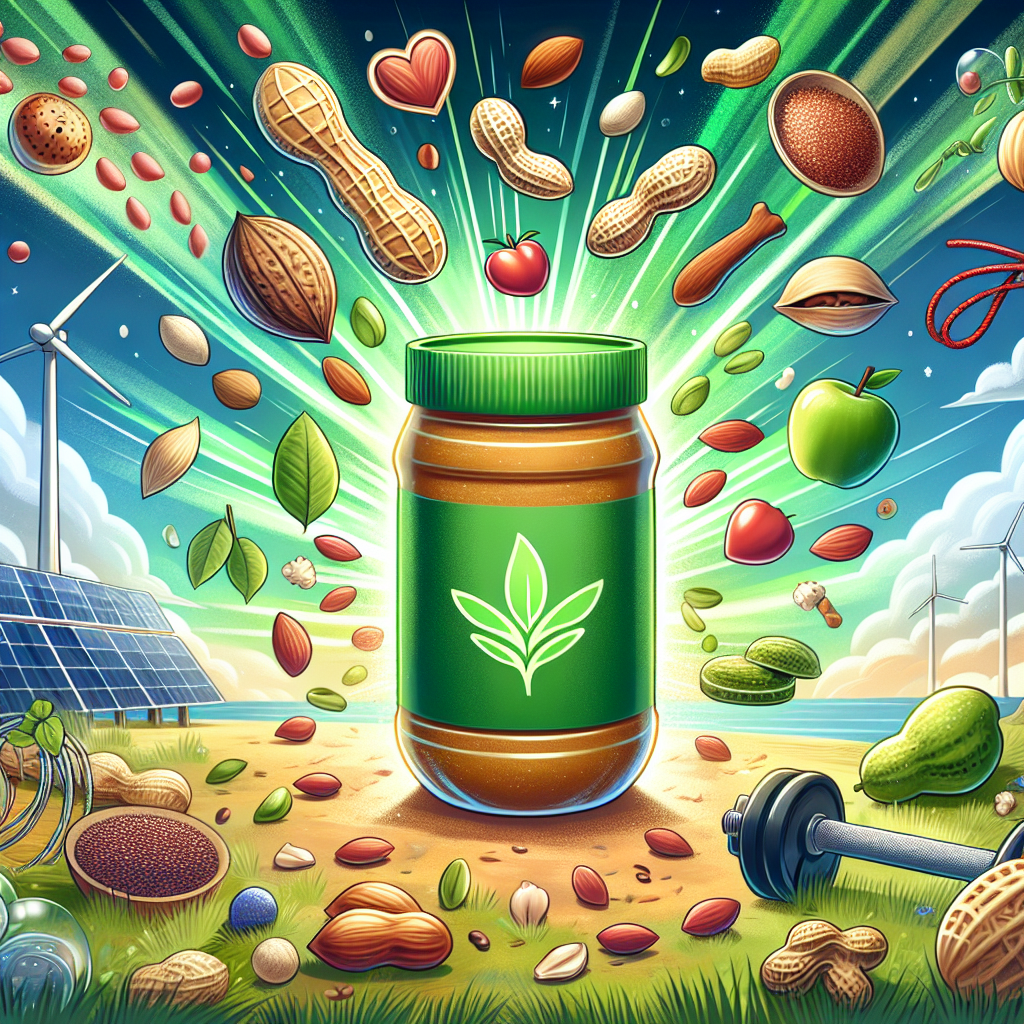Peanut Butter Plant Based: Spreading Green Strength
-
Table of Contents
- Peanut Butter Plant-Based: Unleashing Green Strength
- The Rise of Plant-Based Diets
- Why Peanut Butter?
- Environmental Impact of Peanut Butter Production
- Choosing Sustainable Peanut Butter
- Case Studies: Brands Leading the Way
- Health Benefits: Beyond the Environment
- Recipes and Applications
- Conclusion: Spreading Green Strength
- ETprotein: Your Source for Plant-Based Protein
Peanut Butter Plant-Based: Unleashing Green Strength

Peanut butter has long been a staple in many households, cherished for its rich flavor and creamy texture. However, with the rise of plant-based diets and increased environmental consciousness, peanut butter is now being celebrated not just for its taste but also for its role in a sustainable lifestyle. In this article, we delve into the world of plant-based peanut butter, exploring its benefits, production, and the green strength it spreads.
The Rise of Plant-Based Diets
Plant-based diets have gained significant traction in recent years, driven by health, ethical, and environmental concerns. A growing body of research suggests that diets rich in plant-based foods can lead to lower rates of chronic diseases, such as heart disease, diabetes, and certain cancers. Moreover, the environmental impact of plant-based foods is typically lower than that of animal-based products, as they require less water, land, and energy to produce.
Why Peanut Butter?
Peanut butter is a nutrient-dense food that fits perfectly into a plant-based diet. It is an excellent source of protein, healthy fats, vitamins, and minerals. Here are some of the key benefits of incorporating peanut butter into a plant-based lifestyle:
- High in Protein: Peanut butter provides a significant amount of plant-based protein, which is crucial for muscle repair and growth.
- Heart-Healthy Fats: The monounsaturated and polyunsaturated fats in peanut butter can help to lower bad cholesterol levels and reduce the risk of heart disease.
- Vitamins and Minerals: It is rich in vitamins E and B6, magnesium, potassium, and zinc, contributing to overall health and well-being.
- Fiber: Peanut butter contains dietary fiber, which aids in digestion and promotes a feeling of fullness, helping with weight management.
Environmental Impact of Peanut Butter Production
The production of peanut butter has a relatively low environmental footprint compared to other spreads, such as those derived from dairy or meat products. Peanuts require less water and can be grown in areas with less fertile soil. They also fix nitrogen in the soil, reducing the need for chemical fertilizers. However, it’s essential to consider factors such as transportation, packaging, and the energy used in processing when evaluating the overall impact.
Choosing Sustainable Peanut Butter
When selecting a peanut butter brand, it’s crucial to consider the following factors to ensure you’re supporting sustainable practices:
- Organic Farming: Organic peanut butter is made from peanuts that are grown without synthetic pesticides or fertilizers, which is better for the environment.
- Local Sourcing: Choosing brands that source peanuts locally can reduce the carbon footprint associated with transportation.
- Eco-Friendly Packaging: Brands that use recyclable or biodegradable packaging materials are making efforts to reduce waste.
- Transparent Supply Chains: Companies that provide information about their supply chains are often more committed to ethical and sustainable practices.
Case Studies: Brands Leading the Way
Several brands have emerged as leaders in producing sustainable, plant-based peanut butter. For example, Brand X sources its peanuts from local organic farms and uses glass jars for packaging, which are recyclable and reusable. Brand Y has committed to carbon-neutral production by investing in renewable energy and carbon offset projects.
Health Benefits: Beyond the Environment
The health benefits of peanut butter extend beyond its nutritional profile. Studies have shown that regular consumption of nuts and nut butters can lead to a longer lifespan. The protein and healthy fats in peanut butter can also play a role in weight management by curbing hunger and preventing overeating.
Recipes and Applications
Peanut butter is incredibly versatile and can be used in a variety of recipes:
- Smoothies: Add a spoonful of peanut butter to your morning smoothie for a protein boost.
- Sauces and Dressings: Peanut butter can be the base for delicious sauces and dressings for salads and noodles.
- Baking: Use it in cookies, brownies, and other baked goods for added flavor and moisture.
- Snacks: Spread it on apple slices or celery sticks for a quick and healthy snack.
Conclusion: Spreading Green Strength
Peanut butter is more than just a delicious spread; it’s a symbol of the strength and sustainability of plant-based diets. By choosing peanut butter that is produced sustainably, consumers can contribute to a healthier planet while enjoying the numerous health benefits it offers. As the demand for plant-based products continues to grow, peanut butter will undoubtedly remain a key player in the movement towards a greener, healthier future.
ETprotein: Your Source for Plant-Based Protein
If you’re looking to incorporate more plant-based proteins into your diet, ETprotein offers a range of high-quality protein products. Their selection includes organic rice protein, clear rice protein, pea protein, clear pea protein, pumpkin seed protein, sunflower seed protein, mung bean protein, and peanut protein. These products are ideal for anyone seeking to enhance their health and support sustainable practices.
About ETprotein:
ETprotein, a reputable protein Chinese factory manufacturer and supplier, is renowned for producing, stocking, exporting, and delivering the highest quality organic bulk vegan protein and plant proteins. They include Organic rice protein, clear rice protein, pea protein, clear pea protein, pumpkin seed protein, sunflower seed protein, mung bean protein, peanut protein etc. Their offerings, characterized by a neutral taste, non-GMO, allergen-free attributes, cater to a diverse range of industries. They serve nutraceutical, pharmaceutical, cosmeceutical, veterinary, as well as food and beverage finished product distributors, traders, and manufacturers across Europe, USA, Canada, Australia, Thailand, Japan, Korea, Brazil, and Chile, among others.
ETprotein specialization includes exporting and delivering tailor-made protein powder and finished nutritional supplements. Their extensive product range covers sectors like Food and Beverage, Sports Nutrition, Weight Management, Dietary Supplements, Health and Wellness Products, and Infant Formula, ensuring comprehensive solutions to meet all your protein needs.
As a trusted company by leading global food and beverage brands and Fortune 500 companies, ETprotein reinforces China’s reputation in the global arena. For more information or to sample their products, please contact them and email sales(at)ETprotein.com today.












